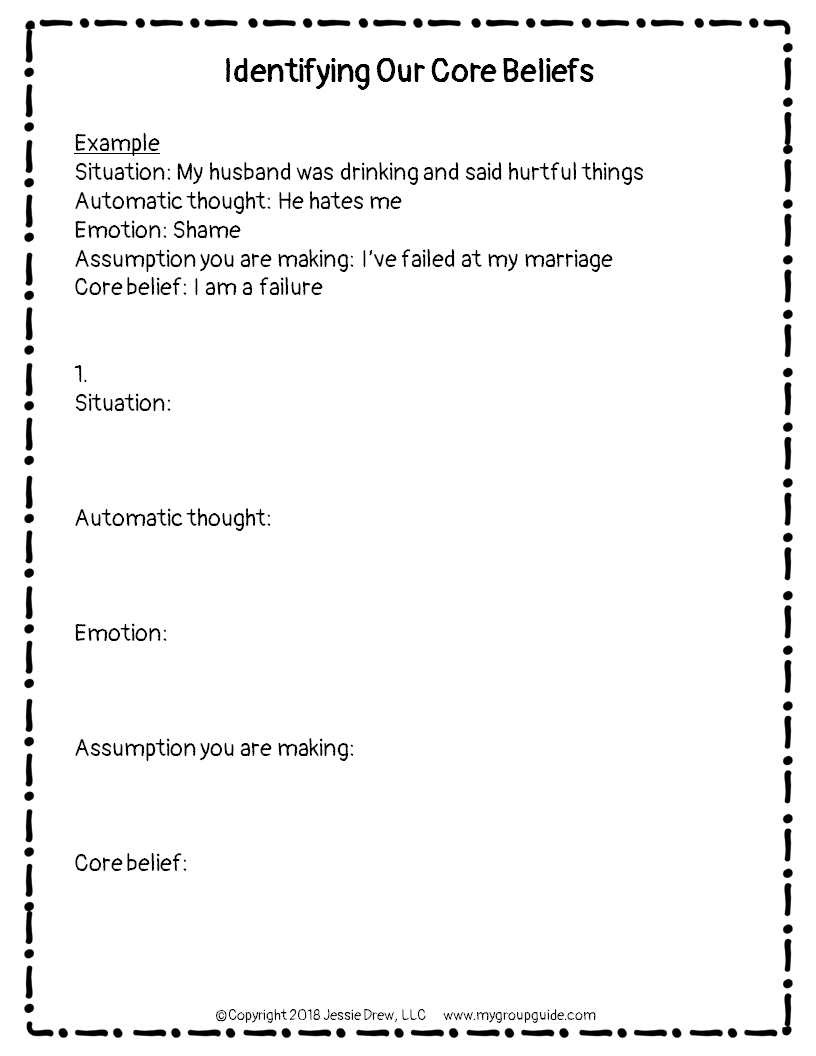Cognitive Distortions:
Core Beliefs
To view this guide as a PDF, click here. For more therapy resources, click here.
Supplemental material (printable PDF): Worksheet: Identifying Our Core Beliefs
Preview of worksheet:
PURPOSE OF GROUP: to identify our core beliefs
to identify our irrational thoughts
MATERIALS NEEDED: pens/pencils for each group member
piece of paper for each group member
print handouts; have enough copies for each group member
1.
-Facilitator opens group by introducing short activity in which group members will explore their “inner critic”.
*Give each group member a piece of paper & pens/pencils. Ask them to tap into their
“inner critic”- the voice in their head that puts them down, beats them up, causes them
to doubt themselves, etc. Tell them to write down what their “inner critic” tells them
*Examples: “Why can’t you get anything right?”; “You should have done a better job”;
“Don’t bother trying- you’ll never be able to do it”
*When they’re done, ask group members to put their paper aside for now
-Tell group members that they will be exploring their “core beliefs” today. A core belief is essentially how we see ourselves and the world around us.
*You can give group members handout with examples of core beliefs (click here– print p. 4)
-Our core beliefs affect how we relate to others and how we react in different situations. Here is an example:
–Core belief: Mary believes, “I am useless”
–Situation: Mary’s best friend, Julie, asks her to help her with a project
–Reaction: Mary tells Julie she should ask someone else for help
2. Ask group members, “Where do you think our core beliefs come from?”
For facilitator to discuss afterwards:
-Our core beliefs usually come from early experiences (i.e. early childhood)
–Example: A child who was neglected by his parents might develop the core belief, “I am
a mistake”
-The core belief may not be true, but it feels true, so it sticks with us throughout life
3.
-Group members will now participate in an activity in which they will further explore their core beliefs about themselves.
*Give group members handout, “Identifying Our Core Beliefs” (click here for handout)
*See if they can identify some of their core beliefs by exploring the thoughts, emotions,
& assumptions that a past situation triggered. Read the example provided on the
handout
*Allow group members to share when they’re done
-You can now ask group members to review the things they wrote down at the beginning of group (when they were asked to explore their “inner critic”). See if they can identify more core beliefs that they hold about themselves (based on what they wrote down).
4.
-Now that group members have identified some of their core beliefs, you can ask them, “How do these core beliefs connect with your experiences in childhood?”
-For example, someone with the core belief, “I am stupid” may have been criticized
often by parents for struggling in school
-If you have some extra time, you can even have the group members participate in a role-play in which they play the role of their parent (or someone else from childhood).
-For example, as the parent, they would say the things they wish they were told as a
child when they were struggling emotionally
5. Facilitator can conclude group by going over ways to change your core beliefs:
-Journal
a. Journaling is a great way to become more aware of your core beliefs (you can’t
change them until you’re aware of them!)
-Identify cognitive distortions
a. For example, “I am a total failure”= all-or-nothing thinking
-Practice using positive affirmations
a. For example, if one of your core beliefs is, “I am not good enough”, practice
saying, “I am good enough”
-Come up with rational responses to your core beliefs
a. For example, if one of your core beliefs is, “I am a failure”, you can point out
the times in which you have succeeded (and note that everyone fails once in a
while- that’s part of life!)
-Eliminate the behaviors that reinforce your core beliefs
a. For example, if one of your core beliefs is, “I am not good enough”, eliminate
the behaviors in which you try to overcompensate, impress people, prove
yourself, etc.
*You can ask group members, “What are some other steps you can take to change your
core beliefs?”
For worksheets, group activities, & more therapy resources, click the button below!

